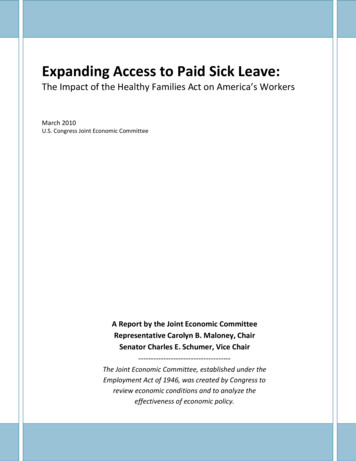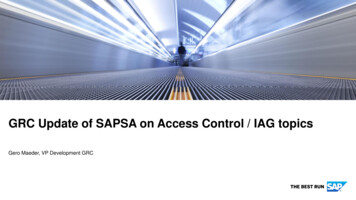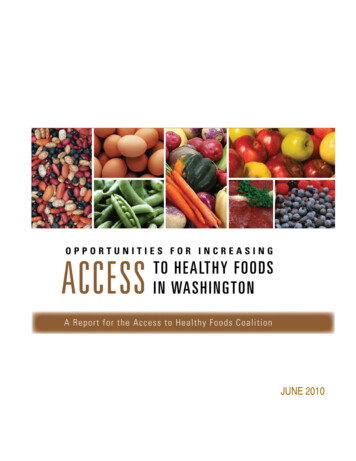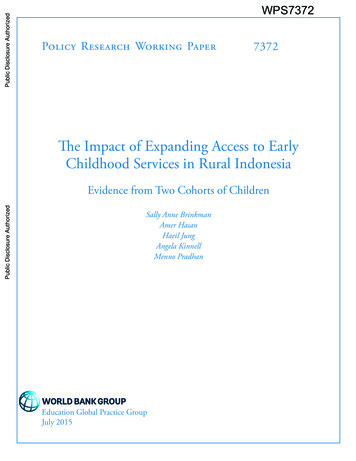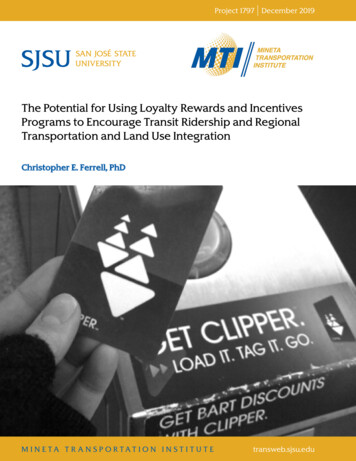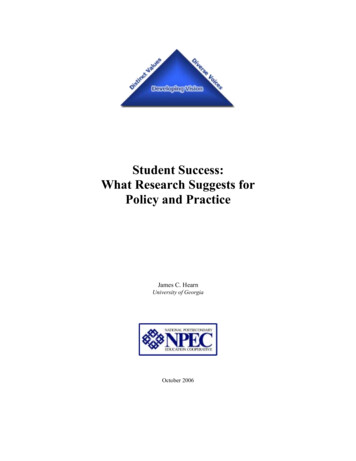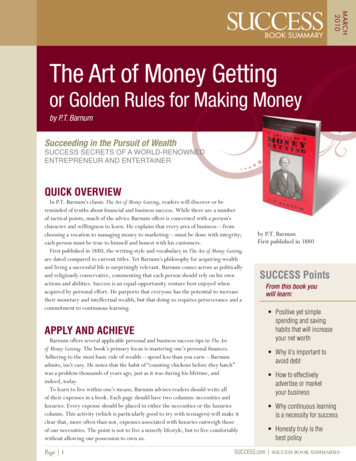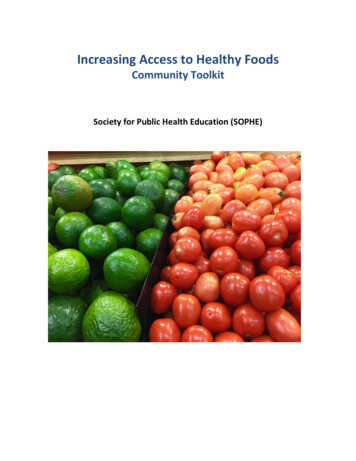
Transcription
The Arizona Commission for Postsecondary Education (ACPE)2004 Annual ReportExpanding Access and Increasing Success in PostsecondaryEducation for Arizona CitizensSubmitted December 28, 2004Dr. April L. Osborn, Executive DirectorIntroductionIn 2004 the 16 Commissioners appointed by the Governor to the Arizona Commissionfor Postsecondary Education (ACPE) initiated a strategic planning process. A roster ofthe current ACPE Commissioners follows this introduction. The purpose of developing aplan was to focus the activity of this small agency and its five staff members in order toincrease productivity and impact in the areas of its statutory authority. The mission andgoals were accepted by Commissioners in October of 2004 and the staff was asked todevelop an action plan, including performance measures, for review by theCommissioners at the first ACPE meeting in 2005. The plan will be revised each yearthrough 2009.The Commissioners examined the ACPE statutes and identified a mission of expandingaccess and increasing success in postsecondary education for Arizona citizens. Threegoals were named to achieve this mission: (1) increase available student financialresources, (2) implement strategies to help students and their families plan, enter, andsucceed in postsecondary education, and (3) provide a forum for all sectors of highereducation to dialogue, partner, and problem solve issues of mutual interest. The thirdgoal is to be supported through policy analysis and research, as well as collaborativeaction taken by task forces.The Arizona Commission for Postsecondary Education staff has identified efficient andeffective administration of the financial assistance programs under their management asthe primary strategy to achieve Goal 1. Strategies employed to achieve Goals 2 and 3include developing opportunities through partnerships, grants, and collaborative effortsto leverage ACPE resources in order to forward its mission.The strategies of efficient and effective administration and leveraging resources throughcollaboration and partnerships are born of necessity, as the agency receives less than 20,000 of state general funds for agency operations. Program administration fees,donations, and grants fund the operational budget of the agency.This ACPE annual report is organized in three sections, each section describes theactivities and services related to each of the three goals. The conclusion summarizeshow the agency focuses its work on the defined mission.1
Commissioners 2004Arizona Commission for Postsecondary EducationMichael R. Rooney, ChairAttorney at LawSacks Tierney, P.A.Dr. Eugene GarciaDean, College of EducationArizona State UniversityJames Dugan, Vice ChairPresidentDeVry UniversityVernon E. JacobsSuperintendentGlendale Union H.S. DistrictKathy AlexanderVice President Director of Southern Arizona CampusUniversity of PhoenixWallace W. LewisCEOThe Art Institute of PhoenixDr. Raul BejaranoSuperintendentSunnyside Unified School DistrictKC MillerFounder & DirectorSouthwest Institute of Healing ArtsDr. Sarah BickelAssociate Provost for Student AffairsNorthern Arizona UniversityDr. Karen A. NicodemusPresidentCochise CollegeCharles BlaggDirectorUnited States Truck Driving School, Inc.Michael A. SmithExecutive DirectorToni & Guy AcademyTeri CandelariaExecutive DirectorArizona Board for Private Postsecondary EducationJoel SidemanExecutive DirectorArizona Board of RegentsCommission StaffDr. April L. OsbornExecutive DirectorToni FleisherProgram SpecialistMila ZaportezaBusiness & Student Financial Assistance ManagerMike SmithStudent Financial Assistance SpecialistJessica SloanCommunications Specialist2
Goal 1: Increasing available student financial resourcesCore responsibilities of the ACPE are related to postsecondary student financialassistance programs. These responsibilities include (1) administration of LeveragingEducation Partnership (LEAP), (2) administration of the Private Postsecondary FinancialAssistance Program (PFAP), (3) management of grant repayment programs, (4)oversight of the state student loan guarantor, and (5) management of the ArizonaFamily College Savings Program. In addition, the reader will find a description of astate wide collaborative effort led by the ACPE to seek additional sources of studentfinancial assistance through the work of the Need Based Financial Aid Task Force in theGoal 3 section of the report.1.1 Leveraging Educational Assistance Partnership (LEAP)The LEAP program, formerly known as the State Student Incentive Grant or SSIGprogram, has been in existence in Arizona since 1972. The LEAP program is a grantthat assists eligible students with substantial financial need, enabling them to pursuehigher education goals. The Arizona Commission for Postsecondary Educationadministers the program, ensuring adherence to all federal regulations and the ArizonaAdministrative Code.The U.S. Department of Education assigns allotments based on a state’s 1976postsecondary education enrollment figures; each state, in turn, must match thisallotment through appropriated state funds. Eligible postsecondary institutions thenprovide funds to match those appropriated by the state. Public and private institutionsare eligible to apply to be reviewed by the ACPE for eligibility to receive these funds.Federal guidelines require that the total LEAP award to a student may not be more than 2,500 or less than 100 for each program year. If the student withdraws, is expelled,or is reduced below half time status, the institution is to collect the award and return it tothe Commission. The Commission then issues a credit to the institution’s LEAP fundaccount.A table follows titled Six Year Summary of LEAP Awards. It illustrates the changes inthe state LEAP program over time.Leveraging Educational Assistance Partnership (LEAP)Six Year Summary of LEAP AwardsF/Y 1998-2004LEAP AwardsDistributed:Total FundsAwardedNumber ofAwardsDistributedAverage 2-20032003-2004 2,731,119 2,727,078 2,990,497 2,811,845 2,838,854 2,864,9374,1893,7844,5953,8053,7004,357 652 721 651 739 767 6583
The state of Arizona LEAP administration is decentralized; therefore, the Commissiondelegates certain functions to participating institutions. The ACPE establishes eligibilityand determines a proportional distribution of funds (based on the number of students) toinstitutions. LEAP recipients are selected by the institutions on the basis of substantialfinancial need established through federal and state statute.Therefore, the changes in the size of the award and the number of grants given arepartially determined by each postsecondary institution according to their enrollmentplan. Decisions by the institution, within federal parameters, on how best to use themoney to assist students works for both students and institutions. This decentralizedsystem has been successful for the 40 institutions participating each year.On-site LEAP program compliance audits are performed every two years by ACPE staff.The last compliance audits started in May and will be finished in early 2005.In 2004 more than 4,000 Leveraging Educational Assistance Partnership (LEAP)awards were provided to 43 postsecondary institutions totaling 2.9 million in leveragedfinancial aid (state, federal, and institutional) to financially needy students. Institutionaldistribution of LEAP awards in 2004 resulted in the following distribution percentages:33% to public universities, 51% to community colleges, 14% to proprietary schools, and2% to private colleges.Annual performance measures collected through anonymous surveys from institutionalfinancial aid administrators have consistently indicated 95% or greater satisfaction withadministration of this program by the ACPE.1.2 Private Postsecondary Education Student Financial Assistance (PFAP)The Arizona Private Postsecondary Education Student Financial Assistance (PFAP)program was initiated in the Spring of 1997. This program was designed to encouragecommunity college graduates to enroll in and graduate from baccalaureate degreegranting private postsecondary institutions; thereby realizing a savings to the State ofArizona.By statute (ARS 15-1852) and Arizona Administrative Code rules (R7-3-401 throughR7-3-405), the PFAP program provides up to 1,500 per fiscal year to eligible Arizonacommunity college graduates (i.e., Associate Degrees) who prove financial need andwho enroll as a full-time student in a baccalaureate degree program at an accredited,baccalaureate degree-granting private postsecondary educational institution in Arizona.The PFAP program funding was reduced in 2003 from 318,000 to 170,500, resultingin fewer students receiving the grant. In response to the limited funding, a pilot programhas been instituted. This pilot program limits the maximum grant to 1,000 and requiresreapplication for a second year grant. These changes are being tested in order to makegrants available to more students to meet the original intent of the PFAP program.4
Approximately 1,000 students have benefited from the PFAP program since theprogram inception. The current program graduation rate is 90.7%, and the currentpercentage of students from whom repayment is sought is 9.3%. The students fromwhom repayment is sought received the grant, but did not complete a bachelors degree.Annual performance measures collected through anonymous surveys frompostsecondary institution administrators of the PFAP program have consistentlyindicated 95% or greater satisfaction with administration of this program by the ACPE.1.3 Student Financial Assistance Repayment ProgramsThe Commission administers repayment programs for the Private PostsecondaryEducation Student Financial Assistance Program (PFAP), the Paul Douglas TeacherScholarship (PDTS), and the Arizona Teacher Incentive Program (ATIP). All formerfinancial assistance program participants are provided three opportunities to complywith the repayment demands placed on them by federal or state guidelines. The Officeof the Attorney General is used for collections only as a last resort when all other effortshave been exhausted. A brief summary of each of these repayment programs follows.There have been 1,034 students awarded the PFAP grant. Of those, 618 recipientshave fulfilled their obligation by receiving their bachelor's degree in the three yearallotted time frame. There are currently 63 former recipients in repayment status. Ofthose, 28 are actively making payments to the Commission; 34 have been referred tothe Office of the Attorney General, and 1 loan was forgiven. All others are presentlyenrolled and are pursuing their bachelors degree.Of the 245 former PDTS recipients, 17 are currently in repayment, 2 are in deferment,and 3 are making payments through the Office of the Attorney General. All others havecompleted their obligation by fulfilling the teaching requirements of the program, or byrepaying their loan in full. Of the 101 former ATIP recipients, 2 are currently inrepayment, and 1 has been referred to the Office of the Attorney General. All othershave completed their obligation by fulfilling the teaching requirements of the program, orby repaying their loan in full.All funds recouped for the PDTS program are forwarded to the U.S. Department ofEducation in June of each year, and any monies received for the ATIP program aredeposited into the State general fund. PFAP repayment funds received are put backinto the PFAP grant fund. Any funds recouped by the Arizona Office of the AttorneyGeneral are returned to the Commission less their 35% recovery fee.1.4 Arizona Oversight of State Student Loan GuarantorThrough the US Department of Education financial institutions are named and thenapproved by the Governor to be designated as the state student loan guarantor. In2004, USA Funds was re-designated to serve as the Arizona State Student LoanGuarantor. The Arizona Commission for Postsecondary Education is named throughstatute to provide oversight of the designated entity.5
As the Arizona State Guarantor for student loans, USA Funds guaranteed 632 millionin new educational loans granted to 68,000 students and 4,900 parents in FY 2003.Due to the increasing costs of postsecondary education, loans are becoming asignificant source of funding to which students and families turn for higher educationcosts.1.5 Arizona Family College Savings Program (AFCSP)The Arizona Commission for Postsecondary Education administers the Arizona FamilyCollege Savings Program (AFCSP). The AFCSP was established as Arizona’s qualifiedtuition program under section 529 of the Internal Revenue Code (also referred to as aQTP or Qualified Tuition Program) in 1997. The AFCSP began accepting accounts in1999.The purpose of a section 529 plan is to provide to families a tax benefit for savingmoney for the higher education of their child or other family members. The earnings onthese savings are tax free when used for qualified educational expenses. Qualifiedexpenses include tuition, supplies, equipment, books, room, and board at anyaccredited public or private college/university, community college, proprietary orvocational/career/technical postsecondary educational institution in the United States.The Arizona Family College Savings Program has undergone significant changes in thepast year. HB 2593 established the AFCSP trust fund, revised the membership of theAFCSP Oversight Committee, revised definitions of terms, and exempted the processfor selection of the AFCSP financial institutions from the state procurement coderequirements of Title 41, Chapter 23. In addition, an increase of 60,000 wasappropriated for administration of the growing program. Revenues to administer theAFCSP are received from one-time fees of 13.00 per each new account.The number of annual new accounts opened in the AFCSP during 2004 (throughNovember) was 14,715. As of November of 2004 the number of AFCSP accounts totals44,145: and the assets under management are more than 231 million. A report of theNew Accounts by Year and Dollars Under Management is included at the end of thissection of the report.An Oversight Committee comprised of 10 members is responsible for review of theprogram rules, statute language revisions, and selection and oversight of financialproviders for the AFCSP. The Oversight Committee makes recommendations to theArizona Commission for Postsecondary Education for the management of the AFCSP.In the 2004 legislative session a revision of the membership of the AFCSP OversightCommittee was undertaken and members with specific credentials were namedincluding a certified financial planner, a certified public accountant, and an attorneycertified in estates and trusts. A current roster of the AFCSP Oversight Committeefollows.6
Oversight CommitteeArizona Family College Savings ProgramDale Walters, ChairPublic Member - Financial PlannerKeats, Connelly & Associates, Inc.John P. GarciaCPADial CorporationRoger D. CurleyAttorney at LawCurley & Allison LLPLaura Palmer NooneState Board - Private Postsecondary EdPresident, University of PhoenixE. Blaine VanceDeputy TreasurerState Treasurers OfficePamela ChanPublic MemberSr. Vice President & CFO - Choice BankMichael McCartneyPublic Member – Financial PlannerPhillip HoflingArizona Corporation CommissionAsst. Director – Securities DivisionCertified Financial Planner(Pending Appointment)President or Chancellor of C.C. District(Pending Appointment)Current financial providers for the AFCSP were selected through the State ProcurementOffice Request for Proposals (RFP) process in 2003, using a Selection Committeecomprised of Oversight Committee members. Both the AFCSP Oversight Committeeand the ACPE approved these selections. The five providers named in the fall of 2003RFP are listed below. The College Savings Bank (offers a CD, only)Securities Management & Research, Inc. (offers mutual funds)Waddell & Reed Financial Services (offers mutual funds)Pacific Life (offers mutual funds)Fidelity Investments (pending finalization of management contract)Fidelity Investments, the newest financial institution, is currently in managementcontract negotiations with the Arizona Commission for Postsecondary Education andproduct development is expected to be undertaken in early 2005.The recent changes in the Arizona Family College Savings Program (AFCSP) statutesaccomplishes three goals: (1) clearly defines the oversight role of the state, (2)strengthens the Oversight Committee through defined expertise of members, and (3)exempts solicitation of financial institutions from the procurement code restrictions. Theincreased appropriation has allowed a nationally recognized legal firm with expertise insecurities law to be contracted, in consultation with the Arizona Attorney General’sOffice, to guide the implementation of the statute revisions named in HB 2593.A report titled New Accounts and Dollars Under Management Chart follows.7
Arizona Family College Savings ProgramNew Accounts Opened and Dollars Under ManagementFY 1999/2000 through November 30, 2004FY 1999/2000 FY 2000/2001Financial Institution Number of Accounts:College Savings BankSecurities Management & ResearchWaddell & ReedPacific LifeTotal Number of Accounts by Year:Dollars Under Management:College Savings BankSecurities Management & ResearchWaddell & ReedPacific LifeTotal Dollars Invested as of 11/30/04:Average Account Contribution Amount:College Savings BankSecurities Management & ResearchWaddell & ReedPacific Life1122150032722238300605CY 2002CY 2003 Jan 1 - Nov 30, 715 65,205,517 7,138,983 143,119,390 16,342,142 231,806,032 24,821.28 2,609.27 4,118.66 5,762.398
Goal 2: Implement strategies to help students and families plan, enroll, andsucceed in postsecondary educationThe Arizona Commission for Postsecondary Education endeavors to expand accessand success in postsecondary education for Arizona families. Providing information fordecision-making, initiating programs to assist students and families access financialassistance, and supporting similar efforts are strategies used to assist Arizona families,adults and K-12 students. Almost every parent holds the dream of college attendancefor their child. The ACPE enters into programs and partnerships to assist parents andstudents as they plan for their dream. It is realistic planning with appropriate andaccurate information that will assure the child is academically ready, the familyfinancially prepared, and the student expectations are in line with the realities ofpostsecondary education. Adult and returning students are included in programplanning as well.2.1 Arizona College and Career Guide (ACCG)The Arizona College & Career Guide (ACCG) lists all Arizona public and privatepostsecondary institutions including proprietary, vocational, and career schools. Eachschool listing includes course offerings, length of study, costs to attend, and financial aidprograms available. This document is the single source of this information for the stateand is widely used by K-12 counselors, high school students, higher educationinstitutions, and the information seeking public. The ACPE has compiled anddisseminated the publication since 1975.This year 10,000 copies of the ACCG were printed for free distribution to public schools,libraries, state agencies, prisons, and higher education institutions. In addition, theACCG is available online at the ACPE Web site, www.azhighered.org. Publication anddistribution cost of the ACCG ( 21,390) are financed through paid advertising in thepublication and per individual book fees ( 5 each or 3 for ten copies or more).2.2 Arizona Commission for Postsecondary Education (ACPE) WebsiteThe ACPE website serves as a resource for links to information about educationalagencies and institutions, financial aid, savings programs, and a myriad of local andnational resources for parents, students, and the public-at-large seeking resourcesregarding higher education. The ACPE web site can be viewed at www.azhighered.org.The ACPE Web Site received 34,409 hits in 2004, exceeding the ACPE goal of 28,000.2.3 College Goal Sunday (CGS)The Arizona Commission for Postsecondary Education hosts an important annual eventtitled College Goal Sunday. College Goal Sunday has been organized for the past eight9
years by the ACPE, and plans are well underway for the 9th Arizona College GoalSunday event.The goal is to provide assistance to high school seniors (or adults enteringpostsecondary education) and their families in completing the Free Application forFederal Student Aid (FAFSA) form. The main purpose is to help students and families,especially first generation college applicants, understand the importance of applying forstudent financial aid, take the important first step of completing the FAFSA, andultimately access postsecondary education.The event is offered in partnership with the Arizona Association of Student Financial AidAdministrators (AASFAA). In 2004 College Goal Sunday was held in 21 Arizonacommunities on February 6. On this Sunday afternoon, more than 250 volunteerfinancial aid professionals from Arizona’s colleges/universities, as well as high schoolcounselors, mobilized to assist high school seniors and their families in completing theFAFSA form. In 2004 two thousand eight hundred and thirty students and parentsattended. Since 1997 more than 18,000 students and their families have been helpedby this event.This event is very successful. The 2004 College Goal Sunday survey reported that 34%of the seniors in attendance indicated that they would be the first member of their familyto attend college. In addition, almost 48% of the participants indicated they hadcompleted the FAFSA form at their College Goal Sunday site for immediate submission.As host of this event, the ACPE seeks grants to fund the activities and provides theleadership to implement the event. Grants have been secured for the 2005 event fromWaddell and Reed, USA Funds, and Lumina Foundation.2.4 “Count Down to College” Sunday InsertIn 2004 a 12 page Sunday insert, entitled “Countdown to College” was published in theArizona Republic and distributed to 465,000 households the Sunday before CollegeGoal Sunday. USA Funds underwrote the basic publication cost of this insert andadditional pages were paid for with purchased advertising by higher education stakeholders through the newspaper sales staff and letters of introduction from the ACPE.Articles in the insert included Arizona & Federal financial aid information, earlyawareness for higher education, information for families on how to prepare for college,as well as promotion of the College Goal Sunday statewide events. This publication isscheduled again in 2005 and will be distributed as a special insert in Phoenix, Tucson,and outlying areas to nearly 800,000 households.2.5 Think College PublicationsThe Arizona Commission for Postsecondary Education is dedicated to strengthening thecommitment of children and youth to obtain a higher education. Toward this end, a10
general education awareness and information campaign for students and their parentstitled Think College has been developed to emphasize the importance of staying inschool, raising expectations, and creating a positive attitude among students and theirparents about postsecondary education possibilities. Three publications weredeveloped with two financial partners: (1) USA Funds sponsors Measuring Your Child’sProgress: Preparing Your Child for Higher Education for middle school through highschool parents and (2) Ed Funds sponsors Carlton Q. Cat: Cool Cats Stay in School forthird and fourth grade students and Future 5: The Power of Your Mind for seventh andeight grade students. Thanks to the generosity of these partners, these publications areprovided to the schools free of charge.In 2000/2001 copies of the 3rd/4th and 7th/8th grade publications were mailed directly toevery elementary school in the state. However, due to limited funds for distributing theThink College publications, the ACPE partnered in both 2001/2002 and 2002/2003 withthe Arizona Department of Education’s Mega Conference and distributed almost 20,000copies of the three publications (English & Spanish) at the November 2003 MegaConference. In 2004 the sponsor not only provided printing of the publications but alsodistributed sample copies to every 3rd/4th and 7th/8th grade classroom in the state andfollowed up on requests received by the ACPE for additional copies.2.6 The STAY in School InitiativeThe public interest resulting from policy analysis and research publications regardingdrop out prevention led the Arizona Commission for Postsecondary Education todevelop the STAY in School Initiative. This Initiative has a final two components for2005 consisting of a community development pilot project in the Tucson SunnysideSchool District and a series of regional capacity building workshops. In 2005 the ACPEwill continue to partner with the Az Department of Education and the Center for theFuture of Arizona as they provide leadership in dropout prevention.Community development consultants have worked with the Sunnyside School Districtand their Stay in School Community Task Force to identify teams of four: one student,teacher, parent and community member from each of the Sunnyside District middle andhigh schools to participate in a Leadership for Learning Academy throughout the 200405 academic year. Beginning with a period of research and analysis the Academy willbe able to explain the primary causes of school dropout in each of the representativeschools. With the support of the Community Task Force the Academy will coordinate,develop, and implement programs and strategies designed to address the underlyingcauses of student dropout in Sunnyside District. The result will be a long-term actionplan to address their problems from a community based, systemic-change model.In order to build leadership for dropout prevention across the state, the ArizonaCommission for Postsecondary Education will contract with a community developmentconsultant to present a series of capacity building workshops in three or four regions ofthe state. The goal of this series is to build on the learning from the pilot project andequip community leaders to address the dropout issue in ways that are consistent withthe values and realities of their school district, town, or region.11
Both components of the Stay in School Initiative have received funding from privatesector sources. The ACPE will continue to participate in collaborations to increasegraduation rates in Arizona2.7 Pathways to Education ConferenceIn 2004 the former Best Practices in Education Conference Task Force revised its focusto more closely align the Conference with the expanding access and increasing successin postsecondary education mission of the ACPE. The Conference was renamed thePathways to Education Conference and the mission revised to showcase and recognizeoutstanding efforts to guide and support youth into higher education. The purpose ofthe 2004 Conference was to foster and encourage efforts to transition students to highschool and into higher education.The October 2nd 2004 conference was held at the Phoenix Preparatory Academy.Conference attendees had the opportunity to participate in two morning sessions ofworkshops focused on successful college preparatory approaches such as: Innovative Approaches from High School to Postsecondary Education: Jobs forArizona’s Graduates (JAG)Early Strategies for College Awareness: The University of Arizona’s EarlyRecruitment Unit – Bridging the College Access DisparityA business panel – Business Creating an Arizona Economy by SupportingStudentsFederal, Business and Community-Based Pathways to Student Success: ArizonaQuest for Kids and Gaining Early Awareness and Readiness for UndergraduatePrograms (GEAR Up)Achieving a College Education (ACE): A Proven Path to Success in High Schooland College and the Genesis AcademyHow to Do College Early: Northland Pioneer College’s Northern Az VocationalInstitute of Technology (N.A.V.I.T.), and Gateway’s Early College High SchoolCharacter Education: Positive Support for Success in EducationAfter a sponsor-hosted luncheon, conference participants heard a youth panelconsisting of youth who experienced an Arizona program such as Project Challenge,the Hispanic Mother Daughter Program, and Jobs for Arizona’s Graduates, thesestudents described the benefits of the programs offered and how they helped themovercome the barriers to postsecondary education.The final segment of the Conference was the awards ceremony. This year there were23 honorable mentions and winners in four categories were recognized with a checkand prizes. The four award winners by category included:Community – Arizona Quest for KidsBusiness – Raytheon Scholars ProgramPostsecondary – Achieving a College Education (ACE)K-12 – Nogales High School Senior Project12
More than 150 participants attended and benefited from the workshops, networking, andfirst-hand knowledge of outstanding Arizona practices focused on supporting youth intheir transitions into higher education.Goal 3: Problem solving across all sectors of postsecondary EducationThe Arizona Commission for Postsecondary Education provides a unique statewideforum for senior level representatives from universities, community colleges,independent colleges, and private training and career colleges to identify mutualopportunities and problems in postsecondary education. In addition, twosuperintendents of large districts and a CEO of a charter school provide insight abouttransition into, preparation for, and awareness of postsecondary education opportunitiesfrom the K-12 perspective.Issues arise from discussion among Commissioners that need further investigation andpolicy analysis. In addition, Commi
who enroll as a full-time student in a baccalaureate degree program at an accredited, baccalaureate degree-granting private postsecondary educational institution in Arizona. The PFAP program funding was reduced in 2003 from 318,000 to 170,500, resulting in fewer students receiving the grant. In response to the limited funding, a pilot program
